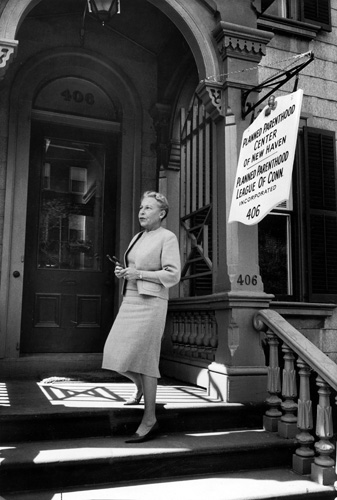In Griswold v. Connecticut, 381 U.S. 479 (1965), the Supreme Court invalidated a Connecticut law that made it a crime to use birth control devices or to advise anyone about their use. Relying in part on penumbras from the First Amendment, this landmark decision elaborated the right to privacy that subsequently became the basis for the Supreme Court’s abortion decision in Roe v. Wade (1973).
The law in question was a holdover from the Comstock era, but Connecticut chose to apply it in the case of Estelle Griswold, executive director of the Planned Parenthood League of Connecticut, and the group’s licensed physician, Dr. C. Lee Buxton, who had prescribed birth control devices to married women.
Court: Couples have a right of privacy to use birth control
Writing for the majority, Justice William O. Douglas began with a review of cases, many of them highlighting that the First Amendment protected such collateral rights as the right of association, the right to educate one’s children, as well as “the right to read . . . and freedom of inquiry, freedom of thought, and freedom to teach.”
Of note, he cited Meyer v. Nebraska (1923), Pierce v. Society of Sisters (1925), and NAACP v. Alabama (1958) in suggesting “that specific guarantees in the Bill of Rights have penumbras [shadows], formed by emanations from these guarantees that help give them life and substance.” Douglas proceeded to link the First Amendment rights to provisions in the Third, Fourth, Fifth, Ninth, and 14th Amendments to formulate a right of privacy adequate to protect married couples preferring to use birth control.
In concurring opinions, Justice Arthur J. Goldberg relied on the Ninth Amendment and its idea of “unenumerated” rights, and Justice John Marshall Harlan II relied on the due process clause of the 14th Amendment to establish a right to privacy. Justice Byron R. White also focused on the role of due process in protecting marital privacy.
Others said law preventing advice on birth control ‘offensive’ but constitutional
In his dissent, Justice Hugo L. Black classified Connecticut’s law as “offensive” but constitutional. He argued that a violation of the First Amendment would have occurred if Connecticut had convicted the doctor simply for conveying advice about contraceptives. He, however, distinguished speech from conduct, stating, “Merely because some speech was used in carrying on that conduct . . . we are not in my view justified in holding that the First Amendment prohibits the State to punish their conduct.”
He further asserted that the right of privacy required the involvement of courts to enforce natural law that was at odds with their constitutional mandate.
Also in dissent, Justice Potter Stewart stated that the Connecticut statute was “an uncommonly silly law” but could find nothing in the First Amendment or other constitutional provisions to invalidate it.
Supreme Court may be called upon to decide if states can ban access to abortion drugs through the mail
In Eisenstadt v. Baird (1972), the Supreme Court extended the right of birth control to unmarried couples, and in Roe v. Wade (1973), the court concluded that the right to abortion was largely a matter for women and their doctors to decide during the first two trimesters.
In Dobbs v. Jackson Women’s Health Organization (2022), however, the Supreme Court reversed course and largely returned this matter to the states for resolution.
This followed a decision by the Federal Drug Administration to allow access to Mifepristone, a drug that induces abortions in early pregnancies, by mail. The Supreme Court will likely have to decide whether states have the right to ban such sales in their states, which would otherwise require their citizens to travel out of state to obtain such access. This had led some scholars to call for the repeal of the currently unenforced Comstock Act, which could be used to regulate the transit of birth control products through the mail.
John Vile is a professor of political science and dean of the Honors College at Middle Tennessee State University. He is co-editor of the Encyclopedia of the First Amendment. This article was originally published in 2009.

